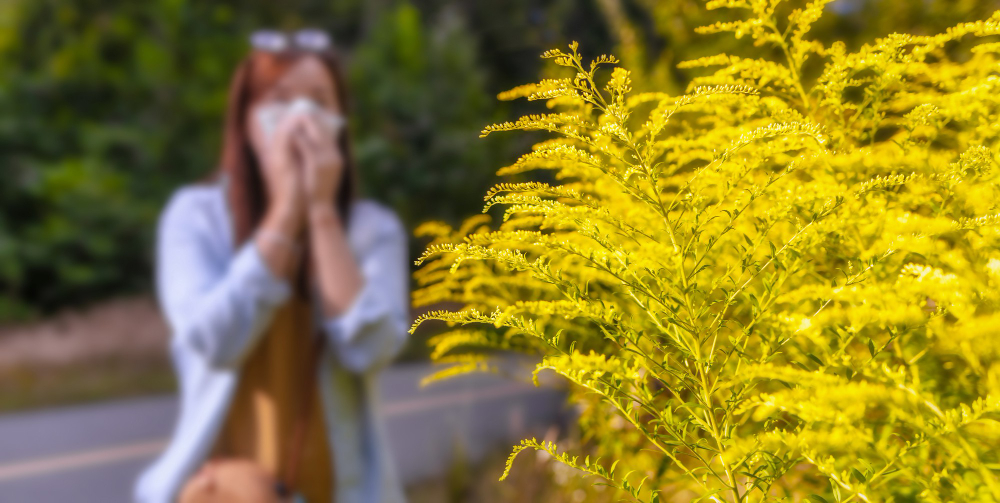
Ragweed Allergy Symptoms
If you experience a runny nose, itchy eyes, sneezing, or headaches, especially during the fall, chances are, you may have seasonal ragweed allergies! Ragweed starts pollinating as early as August, peaks by late September, and can persist till November.
Frontier Allergy helps with ragweed allergies and enables the patients with the most advanced treatment for allergies.
Ragweed Allergies and Symptoms
Pollen from ragweed trees causes the body’s immune system to react. In people with ragweed allergies, their body perceives this pollen as an invader and attacks it.
The immune system of the body promotes chemical changes, releasing Histamine. Histamine causes many uncomfortable reactions, including runny noses, sneezing, and itchy eyes.
The pollen levels may vary with the weather and tend to be higher in warmer temperatures. You may be at risk of developing ragweed allergies if you have:
- Other types of pollen allergies
- Mold or Dust mite allergies
- Family history of ragweed allergy.
Symptoms/Indications of Ragweed Allergies
Symptoms of ragweed allergies are similar to other pollen allergies.
Itchy, Watery Eyes
If your eyes feel itchy and watery for no apparent reason, then you might have ragweed allergy. Your eyes can become irritated when foreign substances (called allergens) come into contact with them.
The majority of eye allergies are seasonal; the remaining are perennial. An itchy, red eye, tearing, conjunctival swelling, and mucous discharge are some of the symptoms of Ragweed pollen. Despite its discomfort, uncomplicated allergic conjunctivitis does not create a threat to your vision.
Sneezing
Sneezing is an irritation of the mucous membranes of the nose or throat. It can be very bothersome, but is rarely a serious health hazard.
The body sneezes to remove irritants from the nose or throat. Sneezes are involuntary air expulsions. The onset of sneezing is often sudden and without warning. Sneezing is also known as “sternutation”.
Headaches, Dizziness
Inside your head, there are tubes called Eustachian tubes that connect your ears to your sinuses. These tubes help drain fluid from your ears and keep the air pressure balanced inside them. Sometimes, if there’s an imbalance in the air pressure, you might feel a bit dizzy.
Your inner ear has something called the vestibular system, which sends signals to your brain about balance. If there’s too much fluid building up in the middle ear, it can cause dizziness as well. This buildup can happen when your body reacts to something you’re allergic to, leading to headaches and dizziness.
Runny Nose
In Allergic Rhinitis, your nose is irritated by something it is allergic to, such as ragweed pollen, resulting in a runny nose. “Rhinorrhea” is the thin, clear discharge often associated with runny noses.
Nasal Congestion
“Stuffy nose” occurs when nasal tissues and blood vessels become swollen with excess fluid, resulting in a “stuffy” sensation. Most people experience nasal congestion as an annoyance. It does not necessarily include nasal discharge or a runny nose.
Rashes
A rash is an abnormal change in the texture or color of the skin. When exposed to ragweed pollen, the skin may become red, bumpy, scaly, itchy, blistered, or welted. A rash usually appears within two days of exposure and resolves on its own within three weeks.
Itchy Throat
One of the most common causes of an itchy throat is allergies. The body’s immune system reacts to an allergen when it encounters it. Allergies can be mild or severe. The presence of an itchy throat may indicate a mild symptom yet uncomfortable to bear.
Coughing or Wheezing
Wheezing occurs when your airways are partially blocked, and you can hear a shrill whistle or coarse rattle-like sound. Pollen from ragweed allergy can block your airways if you hear a whistling sound when you breathe in or out.
A cough is your body’s response to something irritating your throat or airways. Irritating substances stimulate nerves that send messages to the brain. The brain tells your chest and abdomen muscles to expel air from your lungs to force the irritant out of the body.
Sinus Pressure
Ragweed allergy pollen usually causes sinusitis. It causes an infection in the nasal part and creates sinus pressure. Due to the contact with the ragweed pollen, the tissue lining the sinuses is swollen or inflamed. You have sinuses in your cheekbones, forehead, and between your eyes. The mucus they produce keeps the inside of your nose moist.
Frontier Allergy is ready to answer all your queries about ragweed allergy and its treatment. If you have any doubts or questions regarding ragweed allergy, our doctors are here to help you.
Please call 512-382-1933 or email clinic@frontierallergist.com to schedule an appointment today!

Written/Reviewed by: Dr. Neha Reshamwala
NPI number: 1780874578
Page last reviewed: 11/08/2023


 All blog posts
All blog posts





